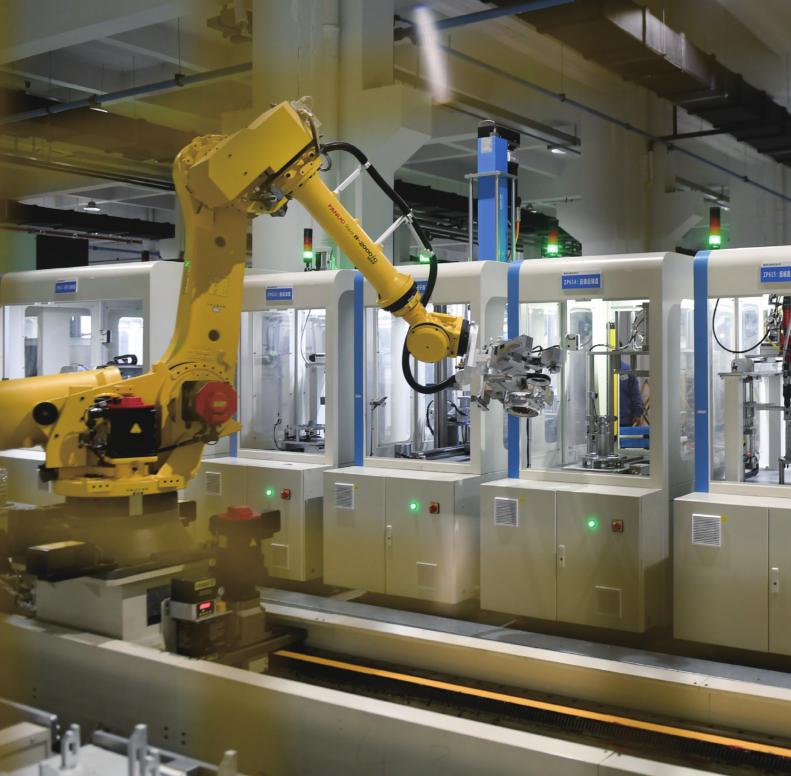Confidence In Innovation
2019-03-27ByLiFangfang
By Li Fangfang

As a reward for his entrepreneurship over the past 10 years, Liu Yi got an opportunity to share his thoughts on the development of the private economy with President Xi Jinping in November 2018.
China has some 180,000 hi-tech companies, of which 70 percent are private enterprises, from which Liu was chosen. He was one of 10 entrepreneurs who delivered their views to the president.
“The private sectors contributions are undeniable for the country to be able to make miraculous achievements in economic development,” Xi said. “All private companies and private entrepreneurs should feel totally reassured and devote themselves to seeking development.”
Xi analyzed the diffi culties and problems facing private companies and motivated company owners by outlining new incentives, including cutting taxes and creating a fairer business environment.
Liu, a member of the 13th National Committee of the Chinese Peoples Political Consultative Conference (CPPCC), Chinas top political advisory body, said he was more confident after the meeting, determined to achieve his mission of leading Chinas environmental protection industry.
Four months later, Liu was delighted to learn that the government will provide more support for the private sector. In the government work report delivered at the Second Session of the 13th National Peoples Congress (NPC) on March 5, Premier Li Keqiang unveiled a host of measures to promote sound economic development in 2019.
Concrete steps
“We will implement larger-scale tax cuts,”said Premier Li. The report stated the government will reduce the value-added tax by 3 percentage points to 13 percent for some industries such as the manufacturing industry. Li noted that the move to cut taxes is a crucial measure to lighten the burden on businesses and boost market dynamism.
“This year, the reduction in tax payments and social insurance contributions of enterprises will total nearly 2 trillion yuan($298 billion), which is the biggest cut in recent years,” said Wang Lin, President of Sichuan Qiyang Auto Group and a deputy to the 13th NPC. “This will encourage companies to invest more in innovation and entrepreneurship.”
Liu founded Act Blue in his hometown in east Chinas Anhui Province in 2009. The company provides solutions to exhaust pollution problems.
“The fi rst set of equipment that I bought was for our lab,” Liu told Beijing Review. “I always wanted to build Act Blue into a hi-tech company, far more than a manufacturer.”
The company was first established to manufacture key parts of an engine to reduce emissions. Now the firm has more business including upgrading existing engine parts and calibration.
“Chinas automobile exhaust emission standard was comparatively low in 2008. But now it has its strictest ever standard where exhaust emissions are almost zero,” Liu said. The upgrading standard is due to technological progress. “The high standard requires industrial iteration. It forces us to quicken our technological research,” he added.
At Act Blue, one third of the employees are research personnel. “Most employees are in their 30s or even younger,” Liu said, adding, “In this innovative era, teamwork is the key. Innovation is the best thing that a team can produce. No matter who our competitors are, we are not satisfied to be followers. We will do our best.”
New frontiers
Many Chinese enterprises hold this open attitude that is not only embodied in their views, but also in their products.
By providing smart home solutions for customers based on its self-developed industrial Internet platform COSMOPlat, household appliance titan Haier moved into the Internet of Things in 2018.
It is now a traditional manufacturer of home appliances as well as a solution provider for improving peoples lives. COSMOPlat, as an open ecology, has attracted innovators from all over the world and empowered small and medium-sized enterprises.
“The platform has provided more than 2.2 million jobs in addition to Haiers more than 80,000 employees,” said Zhou Yunjie, Haiers President and an NPC deputy.
“In contrast to other industrial Internet platforms, COSMOPlat can deal with the contradictions between the high efficiency of large-scale deals and the high accuracy of personalized deals, turning new customers into loyal ones,” Wu Mingxian, General Manager of Haiers cloud service, said.
Currently, COSMOPlat has expanded to 12 industries and covers about 20 countries including the U.S., New Zealand and Russia.
“In the transition of Chinas manufacturing industry, innovation plays a central role,”said Dong Mingzhu, Chair of Gree, another leading appliance maker, and an NPC deputy.
In 2018, as China faced economic downward pressure and a changing external environment with mounting risks and challenges, Gree was able to grow by 33 percent due to its capacity for innovation.
“How should we innovate? From the many choices, we chose to nurture talent,”Dong said. “This years government work report announced a further tax cut for enterprises. Entrepreneurs should have a long-term view and apply more capital to research and development.”
A companys development is infl uenced by many aspects, such as its corporate mission and culture, its leaders personality and the business environment. To boost private companies innovation, the Ministry of Science and Technology has consulted with many private business owners, according to Minister Wang Zhigang, at a press conference on March 11.
The ministry helps build research institutions at private enterprises with clear strategies for technological development.
“If you are willing to devote yourself to the innovation drive and put technology in a prominent position, the Ministry of Science and Technology will treat all companies equal, and all will have the opportunity to gain support,” Wang said.
